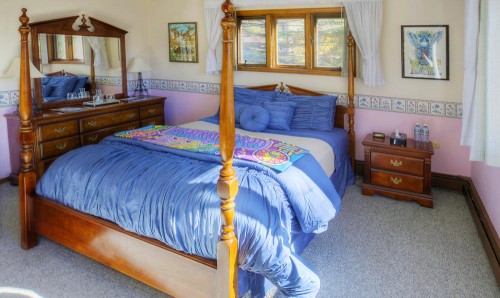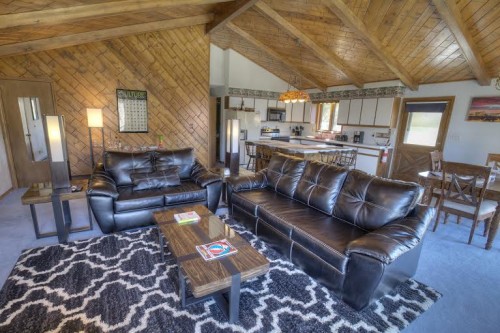SILVERTHORNE — Upstairs at the Bud+Breakfast, the hosts had laid out a fine buffet. Half-eaten store-bought pizzas sat on the stove and the kitchen counter, along with a barely-touched tray of crudité. More importantly, the offerings included five different strains of marijuana, as well as an array of clean pipes and mini-bongs that would make any collector jealous.
It was 4:20 p.m. Happy hour had arrived.
A sliding glass door opened to a long porch and a tremendous view of the peaks surrounding Silverthorne, Colorado. It was a perfect place to hork a fatty, puff a vape pen or eat a THC-infused peach candy ring.
But first, I had to sign a waiver. It read, “I understand and agree that marijuana products are permitted on premises. I further agree that complimentary marijuana products may be available from time to time. By accepting this waiver, I hereby acknowledge that my participation in the consumption of marijuana, both marijuana offered complimentary or supplied from legal outside sources, is at my own risk …”
I’d always wondered what the Brave New World would look like.
Now I knew.
Ski towns
Vail: It’s the only major mountain resort town that doesn’t allow recreational marijuana sales
NEW: Get podcasts of The Cannabist Show.
Subscribe to our newsletter here.
Watch The Cannabist Show.
I went to the downstairs lounge, loaded and lit a bowl of Bruce Banner, and smoked it on the couch with Joel Schneider, owner of the Bud+Breakfast chain that includes three intimate hotels spread throughout Colorado. Schneider isn’t what you might expect a marijuana hotel entrepreneur to be like. Then again, there really isn’t a precedent for what he’s doing. For 30 years, he practiced securities law in New York City. He was burnt out, and, with his kids done with college, he found himself seeking a second career revolving around his true love. “I started smoking when I was 14 years old,” he told me, bluntly. “Marijuana has always been a part of my life.”
But not like it is now.
The marijuana industry found itself in an inchoate phase on the East Coast when Schneider was ready to join. He dabbled with an online paraphernalia company and got involved with some medical dispensaries in Connecticut, but nothing landed. When Colorado legalized weed, he was one of the Green Rush’s early prospectors, buying a suite of companies called Mary Jane Entertainment, which included a music-touring outfit, a lounge in Adams County, a glassblowing factory, a radio station and a newspaper. All were business disasters, and he soon divested. He says, “I would have been able to save them if they were merely struggling.”
Schneider found himself living in a hotel in downtown Denver, with plenty of weed and no decent way to consume it. “I was literally hanging out in the bathroom, shower on, towel under the door, saying ‘This is the most ridiculous thing. We need a hotel.'”
He and his wife started looking at properties. They came upon the Adagio, a six-room traditional 1890 bed-and-breakfast in downtown Denver, owned by a woman who was desperate to retire. The hotel had two living rooms, a huge dining room and a sizable outdoor patio, perfect for what Schneider had in mind. Some budget motels around Colorado were letting people get high in their rooms, but that still felt illicit, junkie-like. Schneider wanted something different.

“We insisted that our guests smoke together,” he says. “We didn’t want them to go in their rooms. You’re smoking in the living room, where you’re supposed to smoke. If you come out in your underwear at 4 in the morning, no big deal, you run into someone else doing the same thing.”
Though that seems like an odd business concept, it worked well enough at the Adagio so that Schneider was able to invest in a second property, a B&B in mountain resort town Silverthorne that had fallen on hard times. “The owners lived in the house, and they were serving frozen breakfast burritos to their guests,” he says.
Summit County has been the site of some of Colorado’s most baroque drama as the state transitions into the recreational cannabis era, but that’s not really on display in Silverthorne, which seems to have embraced the tourism. They welcomed Schneider as a legitimate neighbor. He put in new couches and carpet, as well as new beds, a gas fireplace, a pool table and flat screens in every bedroom and the upstairs living room. In a wise move, the hot tub moved from the garage to an outdoor patio. The second Bud+Breakfast started renting rooms in October.
Proper places to toke
Denver proposal: Activists pursue ballot initiative to allow more places for pot use
Real talk: Why changing rules for Denver marijuana use is a necessity
Editorial: Vaping in bars, smoking on rooftops? Public pot plan goes too far
Pot law expert: Colorado needs spaces for public consumption of marijuana
After a disastrous investment in a marijuana-themed retreat called Cannacamp, which cost Schneider $20,000 and a bunch of embarrassing publicity when the project imploded, he went back to his core business and bought an old motel in Colorado Springs, which is now running as his third B&B property. He has many other ideas, including a series of “Ronald McDonald-like houses for cannabis, which could become an insurable product down the line,” a series of cannabis cruises and a marijuana-themed amusement park.
“I want to be the Walt Disney of cannabis,” he says, as we pass the pipe back and forth. “They’re drinking alcohol at amusement parks. They sell beer and wine. You go to Disney World, they’re selling hard alcohol at those restaurants. I remember the first time I ever went to Disney World. I was in college and, I’ll admit it, my mind was altered. The three-dimensional aspect just blew me away. You saw kids just floating. Maybe I could make that permanent. Why not? Someone’s got to do it.”
More Frontierland than Tomorrowland
If the Bud+Breakfast is Disney World, then it’s definitely more like Frontierland than Tomorrowland. Despite the always-available premium weed and the nice new pool table, the property doesn’t exactly have a fancy vibe. Every surface is always well and thoroughly cleaned, but it’s still an unglamorous 1972 house in an unfancy neighborhood, one street above an outlet mall. The four bedrooms are small, almost like weed caves, and all of them are decorated with Grateful Dead paraphernalia (Schneider is a lifelong Deadhead). My king-sized bed had a dancing bear duvet and a Dead concert poster on the wall. Rates run from $149-$249.

If you’ve ever wanted to revisit your college apartment, The Bud+Breakfast provides the opportunity.
Guests share bathrooms. Again, those bathrooms are very clean, but they also clearly haven’t been remodeled since the house was built. The bathroom in my wing included an ugly, light-brown molded plastic tub with a high sliding glass door that made it look more like a bear trap than someplace to wash.
I was only going to shower there in an extreme emergency.
The place basically exists for the common areas: Couches, coffee tables, a TV, baskets of crunchy snacks and candy and as much pot as you can possibly smoke. It’s a passable simulacrum of the house of your massive stoner friend who also has a decent job. The whole thing is presided over by a good-looking young couple, Stephanie Colner and Michael Roscheleau, who live in and manage the facility, acting, essentially, as 24-hour-a-day marijuana butlers.
More from Neal Pollack
Leaving the Lone Star: Neal Pollack’s Reefer Roadtrip from Texas to Free America (aka Colorado)
“I’ve had people who’ve never smoked pot before,” Colner told me. “I’ve shown people how to load a bowl. It’s just a natural extension of my life in college. I used to host people, feed them, get drunk, get high. But now I get paid, and I’ve got more opportunities for advancement here than at any job I’ve ever had.”
The Bud+Breakfast felt like a halfway house for people who need to transition into the reality of legalized marijuana. “I had a guest from Indiana at the Adagio,” Schneider told me. “She said, ‘Thank you. I haven’t smoked on a couch since college. I’ve been hiding from my parents, I’ve been hiding from my kids. I smoke in the car, smoke in the garage or sneak a hit outside. For me, to be able to sit on the couch with other people, that’s liberating.'”
That’s not to say the world’s first pot hotel chain lacks drama. Marijuana is still a vice, after all, and sketchiness lurks. The moment I arrived, some kid was arguing with Colner and Roscheleau, begging to stay at the place, but they wouldn’t let him because he was under 21. While I sat there smoking a bowl, someone called. Colner answered, and hung up after a terse conversation. “He wanted to know if we were near any strip clubs,” she said.

Also, community can be a bit tenuous. The night I stayed, a friendly couple from Wisconsin and a middle-aged guy from Maryland who was on some kind of weird vision quest seemed quite game, but there was also a couple from North Carolina who didn’t appear to be smoking weed and didn’t appear interested in even looking at, much less hanging out with, the other guests.
Not everyone wants to spend their holiday getting stoned on a couch with strangers.
The rest of us got high in proximity to one another. I went out to dinner. Roscheleau was playing pool. “We’ll be here for you, friend!” he said, as I walked out the door. I thought, It’s OK, man. I already have friends.
When I came home, the guy from Maryland sat upstairs, sucking on a bong and watching “Archer.” I went outside and smoked. The couple from Wisconsin appeared and they also smoked. We were all very high, high up in the mountains, all the livelong day. Roscheleau starting talking about marijuana politics, and everyone nodded along, taking their first tenuous, bleary peek out of the cannabis closet. The Bud+Breakfast’s handsome host was there to educate them.
I went to bed and slept dreamily, at least after Roscheleau came in and manually closed my window, which had a broken crank. When I woke up, I thought it was 9:30 a.m. but it was actually 6:30 a.m. I drank some water, puffed a vape pen and popped a gummy. Sunrise in the Rockies had never looked so bright.
At 7:15, Roscheleau came out of his private apartment.
“Good morning, friend!” he said. “Want to smoke a bowl?”
Just add weed
I did. By 8 a.m., everyone else had joined me. A conversation about the Fibonacci sequence, which I was too stoned to follow, erupted. Then Colner appeared and started pulling together one of the best B&B morning spreads I’ve encountered: Eggs and bacon, biscuits and gravy, pancakes, fruit, yogurt, four different juices and many cups of cannabis’ most vital cousin, coffee. Most importantly, the marijuana buffet had reappeared, with fresh strains and fresh pipes. I felt very awake, and very baked, and I couldn’t wait to get to my next destination so I could take a shower in something that didn’t resemble an abandoned tugboat in Soviet-era Poland.
“It’s so much more relaxing up here than in Denver,” said Colner, who previously worked at the Adagio. “One time there I got a call from a guest whose doorknob fell off in the middle of the night. Crazy things are always going on.”
